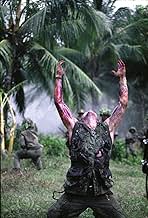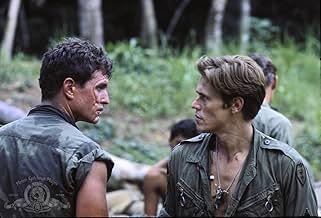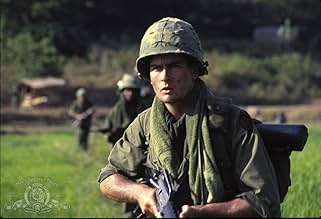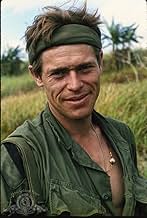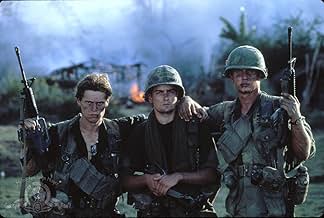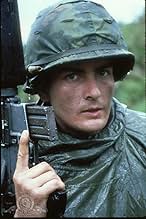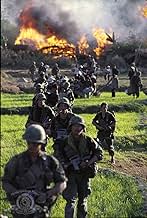Una giovane recluta in Vietnam deve adattarsi a sopravvivere e a sopportare gli orrori della guerra.Una giovane recluta in Vietnam deve adattarsi a sopravvivere e a sopportare gli orrori della guerra.Una giovane recluta in Vietnam deve adattarsi a sopravvivere e a sopportare gli orrori della guerra.
- Regia
- Sceneggiatura
- Star
- Vincitore di 4 Oscar
- 24 vittorie e 16 candidature totali
Riepilogo
Reviewers say 'Platoon' is acclaimed for its realistic Vietnam War portrayal, highlighting soldiers' moral and psychological struggles. Oliver Stone's veteran experience enhances authenticity. The film is lauded for its gritty style and strong performances by Willem Dafoe and Tom Berenger. However, some critics argue it oversimplifies moral issues and lacks historical accuracy. Its anti-war message is both praised and criticized for being simplistic and propagandistic. Despite mixed views on artistic merit, 'Platoon' is recognized for its emotional impact and resonance.
Recensioni in evidenza
Many great war films of the Vietnam conflict are centered around these themes of blurred morality and the uselessness of war, and Oliver Stone's Platoon is among the most well known. Stone, who wrote and directed the film and also served as an infantryman in Vietnam, first rose to fame for his war films that dramatized the infamous Cold War conflict. The main premise of his magnum opus are the inner conflicts within US forces deployed to southeast Asia, rather than the actual physical conflicts between them and the Communist-allied Vietnamese forces. More broadly, Platoon analyzes the "duality of man" concept that has been studied in numerous other works, from fellow Vietnam War films like Full Metal Jacket (1987) and Apocalypse Now (1979), all the way back to the latter's source material and inspiration in Joseph Conrad's Heart of Darkness.
Platoon focuses on the moral decay of soldiers in American units, and how this contributes to their inability to fight their Vietnamese enemies. Charlie Sheen sums up this theme with his on-the-nose voiceover, "We did not fight the enemy, we fought ourselves... and the enemy was in us."
Vietnam War-movies tend to be even harder to watch than most war flicks, as the lines between the "heroes" and "villains" are blurred more than in any other dramatized period of warfare in recent human history. In wars like World War II, which are widely known for being as black and white as military conflicts have become, the contrasting features between the heroic forces we are meant to root for and their opposing enemy platoons are well defined. That is almost never the case with the United States-North Vietnamese/Vietcong conflict in Vietnam during the overarching Cold War.
That is not to say that most wars throughout human history have not been many shades of grey, with the winners and losers not always corresponding with the righteous and evil. But because of the guerrilla nature and infamous legacy of the Vietnam War itself - namely, the immense public protest against American involvement - the Vietnam War remains by far the most unpopular war in modern American history. With that said, most of the film is fantastic, from the aforementioned narrative to the grim lightning of the southeast Asian jungles that emphasize the film's tone, to the poignant, melancholic score.
Platoon focuses on the moral decay of soldiers in American units, and how this contributes to their inability to fight their Vietnamese enemies. Charlie Sheen sums up this theme with his on-the-nose voiceover, "We did not fight the enemy, we fought ourselves... and the enemy was in us."
Vietnam War-movies tend to be even harder to watch than most war flicks, as the lines between the "heroes" and "villains" are blurred more than in any other dramatized period of warfare in recent human history. In wars like World War II, which are widely known for being as black and white as military conflicts have become, the contrasting features between the heroic forces we are meant to root for and their opposing enemy platoons are well defined. That is almost never the case with the United States-North Vietnamese/Vietcong conflict in Vietnam during the overarching Cold War.
That is not to say that most wars throughout human history have not been many shades of grey, with the winners and losers not always corresponding with the righteous and evil. But because of the guerrilla nature and infamous legacy of the Vietnam War itself - namely, the immense public protest against American involvement - the Vietnam War remains by far the most unpopular war in modern American history. With that said, most of the film is fantastic, from the aforementioned narrative to the grim lightning of the southeast Asian jungles that emphasize the film's tone, to the poignant, melancholic score.
Its hard to know where to start with such a breathtaking film. Oliver Stone's Platoon is quite simply the best Vietnam war film ever made in my opinion. Everything about it is as close to perfection as we are likely to see. Charlie Sheen plays the lead, and Willem Defoe and Tom Berenger play the two sergeants that form a key part of the plot.
Chris Taylor (Sheen) is torn between the sergeants. Barnes (Berenger) is the battle hardened, brutal murderer, who uses the war as an excuse to tender to his sadistic pleasures. Elias (Defoe) is the other side of the spectrum. We get the sense that he has wrestled with his inner demons, but he has successfully come through to the other side. He has compassion for his fellow man, and he uses drugs as a form of escapism from this brutal war. The two symbolise the struggle that Taylor must face if he is to survive out in Vietnam.
Oliver Stone perfectly captures war. The shooting is frantic and impossible to follow. It perfectly disorientates us, just as the soldiers were. We have no idea who is being shot at, and neither do they. We follow the war at ground level, and see the brutalities first hand. Having served in Vietnam, the film is loosely based on Stone's time out there, and Taylor loosely based on himself.
Full Metal Jacket showcases how inhumane the war was, Apocalypse Now turns it into a story about life in general, and hopelessness, but Platoon has everything. Trying hard to avoid the old cliché, but if you only watch one war film, make sure it is this one. Nothing else can come close.
Chris Taylor (Sheen) is torn between the sergeants. Barnes (Berenger) is the battle hardened, brutal murderer, who uses the war as an excuse to tender to his sadistic pleasures. Elias (Defoe) is the other side of the spectrum. We get the sense that he has wrestled with his inner demons, but he has successfully come through to the other side. He has compassion for his fellow man, and he uses drugs as a form of escapism from this brutal war. The two symbolise the struggle that Taylor must face if he is to survive out in Vietnam.
Oliver Stone perfectly captures war. The shooting is frantic and impossible to follow. It perfectly disorientates us, just as the soldiers were. We have no idea who is being shot at, and neither do they. We follow the war at ground level, and see the brutalities first hand. Having served in Vietnam, the film is loosely based on Stone's time out there, and Taylor loosely based on himself.
Full Metal Jacket showcases how inhumane the war was, Apocalypse Now turns it into a story about life in general, and hopelessness, but Platoon has everything. Trying hard to avoid the old cliché, but if you only watch one war film, make sure it is this one. Nothing else can come close.
The 1980s in general and the mid 1980s in particular aren't highly regarded where pop culture is concerned , this is most especially true in cinema where films seemed to be written around their soundtrack in much the same way as Hollywood movies nowadays seem to be written around their special effects . PLATOON is one of the very few films from that period that has an emotional impact , an impact that it still retains while watching it in 2003.
Everyone else seems to have mentioned what makes PLATOON a classic anti-war ( Note it's anti-war , not anti American or anti soldier ) movie along with being a classic movie , so I won't go over old ground except to say THAT death scene is up there with all the other tear jerking scenes from 20th century cinema , don't be ashamed to say you cried
If PLATOON has a flaw it's in its duality , there's the good Sarge/bad Sarge , good officer/bad officer , good white guy/bad white guy , good black guy/bad black boy etc which is maybe a bit clichéd and possibly leads me to believe Stone is making an excuse/reason that the Americans lost in Vietnam because that spent so much fighting each other rather than the VC ( Though I do concede I'm possibly misinterpreting that as an excuse or even a reason since no one will confuse the politics of Stone with the politics of John Wayne ) while Taylor's character comes across as being more of a literary device rather than a real human being , but these are minor flaws
It's a shame to see war films from the last few years devoid of scathing anti-war sentiments like the ones seen here . PLATOON screams at you " War is hell and whatever the rights and wrongs of conflict you need a bloody good reason to wage war . Vietnam wasn't a good enough reason to sacrifice human lives "
Everyone else seems to have mentioned what makes PLATOON a classic anti-war ( Note it's anti-war , not anti American or anti soldier ) movie along with being a classic movie , so I won't go over old ground except to say THAT death scene is up there with all the other tear jerking scenes from 20th century cinema , don't be ashamed to say you cried
If PLATOON has a flaw it's in its duality , there's the good Sarge/bad Sarge , good officer/bad officer , good white guy/bad white guy , good black guy/bad black boy etc which is maybe a bit clichéd and possibly leads me to believe Stone is making an excuse/reason that the Americans lost in Vietnam because that spent so much fighting each other rather than the VC ( Though I do concede I'm possibly misinterpreting that as an excuse or even a reason since no one will confuse the politics of Stone with the politics of John Wayne ) while Taylor's character comes across as being more of a literary device rather than a real human being , but these are minor flaws
It's a shame to see war films from the last few years devoid of scathing anti-war sentiments like the ones seen here . PLATOON screams at you " War is hell and whatever the rights and wrongs of conflict you need a bloody good reason to wage war . Vietnam wasn't a good enough reason to sacrifice human lives "
At the height of the Vietnam War, America's teens are drafted into the war effort to find themselves in the middle of hell. One such young man is Chris Taylor. He is placed in a squadron where two sergeants have different approaches to the war Elias is more about surviving without being brutal or cruel, whereas Barnes is crueller, more ruthless and more violent. During the course of his term, Taylor's very soul is torn between the two men as he deals with what he must do.
The first film in Oliver Stone's unofficial trilogy is arguably the best of the three. The basic story not only shows us what the war was like for those serving but also how the different personalities come out of those involved in it. As we follow Taylor we see him change as he is influenced by those around him and by his situation. It makes for an uncomfortable film but one that's worth watching. It's certainly a better war movie than things like Wild Geese or The Dirty Dozen, simply because it's a little more real to what happens than those ones.
Charlie Sheen has never been better than when he's acting for Stone. Here he gives one of his best ever performances as the innocent who is changed. Willem Dafoe is a great actor and here is no different he also gives us one of the film's most enduring images so I'm a little biased. Berenger is another one for whom it's hard to think of a higher point reached than when he did this film. He is brutal and ruthless but he makes us support him in a strange way. The support cast are all good and contains a few famous faces (John C McGinley, Whitaker, Depp) however this is really a three man show.
Overall this is brutal and violent with no happy ending. At the end of the day isn't that what a war film should be?
The first film in Oliver Stone's unofficial trilogy is arguably the best of the three. The basic story not only shows us what the war was like for those serving but also how the different personalities come out of those involved in it. As we follow Taylor we see him change as he is influenced by those around him and by his situation. It makes for an uncomfortable film but one that's worth watching. It's certainly a better war movie than things like Wild Geese or The Dirty Dozen, simply because it's a little more real to what happens than those ones.
Charlie Sheen has never been better than when he's acting for Stone. Here he gives one of his best ever performances as the innocent who is changed. Willem Dafoe is a great actor and here is no different he also gives us one of the film's most enduring images so I'm a little biased. Berenger is another one for whom it's hard to think of a higher point reached than when he did this film. He is brutal and ruthless but he makes us support him in a strange way. The support cast are all good and contains a few famous faces (John C McGinley, Whitaker, Depp) however this is really a three man show.
Overall this is brutal and violent with no happy ending. At the end of the day isn't that what a war film should be?
Ever since Steven Spielberg wowed the cinematic world and changed the aesthetic of the war movie forever with the exceptional opening 25 minutes of 1998's Saving Private Ryan - the film went downhill from there - audiences have come to expect the same grainy camera-work and ultra-realism of Spielberg's breathtaking vision whenever a battle is depicted. Anything else would be 'unrealistic', and many movies dated horribly almost overnight as a result. While Oliver Stone's Platoon, which was once considered difficult to watch due to its unflinching depiction of the insanity of war, may not seem quite as brutal as it used to, it possesses one thing that no war other movie can boast - the guiding hand of a veteran.
Stone did a tour in Vietnam which ended in 1968, changing the future writer/director forever. Starting out life as a screenplay focusing on a soldier's experiences both before and during the war which had Jim Morrison touted for the lead, it evolved into a movie focused solely on a young volunteer's time spent in the sweaty, eternally damp jungle. Charlie Sheen's Chris Taylor is an obvious stand-in for Stone, and he arrives fresh-faced and eager to fight for his country. By the end, he is dazed and confused, and angry at the country who would send such "bottom of the barrel" men - invisible in society - into a world of such horror and meaningless bloodshed. It's an experience that moulded Stone into the one of the most outspoken voices in cinema.
The casting of the two sergeants vying for Chris' soul is a stroke of genius. The platoon is made up of two main groups - the 'juicers', a collection of beer-swilling meat-heads seemingly intent on violence at every opportunity, and the 'heads', a more laid-back and weary bunch who are happiest when getting high and having a singalong. At the head of the juicers is Sgt. Barnes, played by Tom Berenger, an actor known for his heart-throb leading-man roles but here cast as a dead-eyed, heavily scarred brute. While Willem Dafoe, who was and still is known for his crazy-eyed villainous roles, plays the wiser, gentler leader of the heads, an all-round good guy battling his own demons. By toying with expectations, Stone adds layers to their characters, and they both received Best Actor nominations for their efforts.
Yet what makes Platoon truly stand out 30 years after its release is the way Stone manages to transport the audience to that terrible place. It's teeming with dangers at every turn, be it the ants, the snakes or the Viet Cong better equipped for the harsh surroundings, the most frightening moment is when they fall asleep. And even when they awake, there's something moving in the shadows. The film never allows you to ever be at ease, despite the fun to be had with spotting the many famous faces dotted throughout the supporting cast. There are flaws, especially with some overacting from some of the supporting cast - in particular John C. McGinley - and Chris' unnecessary, rambling narration, but the movie packs such a punch that it's easy to forget these quibbles. It's a true insight into the mind of a grunt and how combat can have a lasting, eye-opening effect on those on the ground, and undoubtedly one of the most important war pictures ever to come out of the US.
Stone did a tour in Vietnam which ended in 1968, changing the future writer/director forever. Starting out life as a screenplay focusing on a soldier's experiences both before and during the war which had Jim Morrison touted for the lead, it evolved into a movie focused solely on a young volunteer's time spent in the sweaty, eternally damp jungle. Charlie Sheen's Chris Taylor is an obvious stand-in for Stone, and he arrives fresh-faced and eager to fight for his country. By the end, he is dazed and confused, and angry at the country who would send such "bottom of the barrel" men - invisible in society - into a world of such horror and meaningless bloodshed. It's an experience that moulded Stone into the one of the most outspoken voices in cinema.
The casting of the two sergeants vying for Chris' soul is a stroke of genius. The platoon is made up of two main groups - the 'juicers', a collection of beer-swilling meat-heads seemingly intent on violence at every opportunity, and the 'heads', a more laid-back and weary bunch who are happiest when getting high and having a singalong. At the head of the juicers is Sgt. Barnes, played by Tom Berenger, an actor known for his heart-throb leading-man roles but here cast as a dead-eyed, heavily scarred brute. While Willem Dafoe, who was and still is known for his crazy-eyed villainous roles, plays the wiser, gentler leader of the heads, an all-round good guy battling his own demons. By toying with expectations, Stone adds layers to their characters, and they both received Best Actor nominations for their efforts.
Yet what makes Platoon truly stand out 30 years after its release is the way Stone manages to transport the audience to that terrible place. It's teeming with dangers at every turn, be it the ants, the snakes or the Viet Cong better equipped for the harsh surroundings, the most frightening moment is when they fall asleep. And even when they awake, there's something moving in the shadows. The film never allows you to ever be at ease, despite the fun to be had with spotting the many famous faces dotted throughout the supporting cast. There are flaws, especially with some overacting from some of the supporting cast - in particular John C. McGinley - and Chris' unnecessary, rambling narration, but the movie packs such a punch that it's easy to forget these quibbles. It's a true insight into the mind of a grunt and how combat can have a lasting, eye-opening effect on those on the ground, and undoubtedly one of the most important war pictures ever to come out of the US.
Oscars Best Picture Winners, Ranked
Oscars Best Picture Winners, Ranked
See the complete list of Oscars Best Picture winners, ranked by IMDb ratings.
Lo sapevi?
- QuizAccording to Oliver Stone, he intentionally cast Tom Berenger and Willem Dafoe against type. Berenger was mostly famous for playing good guys, while Dafoe had primarily played villains up until then. Both men received Oscar nominations for their work.
- BlooperWhen the men are playing cards, one of the men is looking at a Playboy from March 1971, despite the film taking place in 1967.
- Citazioni
[Refering to Vietnam]
Chris Taylor: Somebody once wrote, "Hell is the impossibility of reason." That's what this place feels like. Hell. I hate it already, and it's only been a week. Some goddamn week.
- Versioni alternativeTV version has much of its dialogue redubbed and shots refilmed, replacing such lines as "He thinks he's Jesus F---in' Christ!" with "He thinks he's George Freakin' Washington!"
- ConnessioniEdited into A Tour of the Inferno: Revisiting 'Platoon' (2001)
- Colonne sonoreAdagio for Strings
Written by Samuel Barber
Arranged and Conducted by Georges Delerue
Used by arrangement with G. Schirmer, Inc.
I più visti
Accedi per valutare e creare un elenco di titoli salvati per ottenere consigli personalizzati
Everything New on Prime Video in June
Everything New on Prime Video in June
Your guide to all the new movies and shows streaming on Prime Video in the US this month.
Dettagli
Botteghino
- Budget
- 6.000.000 USD (previsto)
- Lordo Stati Uniti e Canada
- 138.530.565 USD
- Fine settimana di apertura Stati Uniti e Canada
- 241.080 USD
- 21 dic 1986
- Lordo in tutto il mondo
- 138.546.255 USD
- Tempo di esecuzione2 ore
- Colore
- Mix di suoni
- Proporzioni
- 1.85 : 1
Contribuisci a questa pagina
Suggerisci una modifica o aggiungi i contenuti mancanti








